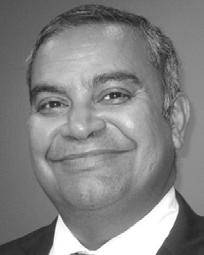
5 minute read
Australian Sikh leaders must speak out against Hindu temple vandalism
from 2023-01 Sydney
by Indian Link
Ahead of a controversial Sikh referendum in Melbourne, there are concerns that Sikh separatist groups have infiltrated Australia, and the call is out for this to be confronted head on
BY PAWAN LUTHRA
Sixteen months after it was first launched, the contentious issue of the Khalistan referendum has reached Australia.
Set to be conducted on 29 Jan at Federation Square in Melbourne by the US-based organisation Sikhs for Justice (SFJ), the referendum will seek vote on the question, “Should Indian-governed Punjab be an independent country?” This will be the fifth international vote after being held in the UK, Italy, Canada and Switzerland.
The SFJ claims that over 400,000 Sikhs across these four nations have voted on the question, though it is believed that SFJ has very poor following in Punjab itself.
The organisation, which describes itself as a human rights advocacy group, is a New Yorkbased secessionist group whose key aim is to establish a separate Sikh homeland – Khalistan – through ‘Punjab Referendum 2020’. Sikhsforjustice.org was formed in 2007. The SFJ “believes in the power of people to take collective action and use human rights to resolve community challenges and advocacy as a tool for justice and social change”. The website describes ‘Punjab Referendum 2020’ as a campaign to “liberate Punjab, currently occupied by India. The campaign aims to gage the will of the Punjabi people with regards to reestablishing Punjab as a nation state. The SFJ has proposed that this be achieved by carving out the north Indian state of Punjab, parts of Haryana and Himachal Pradesh, and several districts of Rajasthan and Uttar
Pradesh. Once we establish a consensus on the question of independence, we will then present the case to the United Nations for re-establishing the country of Punjab.”
This is at odds with their latest post on Twitter. As India prepares to celebrate its 73rd Republic Day on 26 January, Sikhs for Justice co-founder Gurupatwant Singh Pannu posted a video on social media asserting to execute a terrorist attack. In the posted video, he claimed he intended to “liberate Punjab from Indian occupation in 2023”.
“Stay indoors on January 26, or you’ll be thwarted by the SFJ. Delhi will be our target, and we will unfurl the flag of Khalistan,” said Pannu. He also offered US$500,000 dollars to anyone who unfurls Khalistan’s flag on the Red Fort, said a report in India Today magazine.
In July 2019, in a Union Cabinet meeting chaired by Prime Minister Modi, India banned the pro-Khalistani group Sikhs for Justice for its purported anti-national activities. The Union Cabinet decided to declare SFJ an unlawful association under the Unlawful Activities (Prevention) Act, 1967.
The Indian Ministry of External Affairs has said that “in the garb of the so-called referendum for Sikhs, SFJ is actually espousing secessionism and militant ideology in Punjab, while operating from safe havens on foreign soils and actively supported by inimical forces in other countries.”
Temple Vandalism In Melbourne
Meanwhile, as we go to press there have been a series of graffiti attacks against Indian temples in Melbourne allegedly by proKhalistani supporters.
In incidents which have shocked the
Indian community here in Australia, Melbourne’s Albert Park’s Hare Krishna Temple, Mill Park BAPS Swaminarayan Mandir and Carrum Downs Shri Shiva Vishnu Temple have been defaced by antiIndia graffiti.
The walls of the Hindu temples had the slogans ‘Hindustan Murdabad,’ and ‘Khalistan Zindabad’ splashed across the front, and with praises of Jarnail Singh Bhindranwale, the controversial Sikh militant leader.
In a press release, the BAPS Swaminarayan management has appealed for peace. “We are deeply saddened by the anti-India graffiti at the gates of the BAPS Shri Swaminarayan Mandir in Mill Park, Melbourne, Australia by anti-social elements. The BAPS temple in Mill Park, like all temples of BAPS worldwide, is an abode of peace, harmony, equality, selfless service, and universal Hindu values,” said a spokesperson for the temple.
“At this time, His Holiness Mahant Swami Maharaj, the spiritual leader of the BAPS Swaminarayan Sanstha, has prayed for peace and unity and has appealed to all devotees and well-wishers to maintain peace. Let us all join in worldwide prayers, in private and at home, that God blesses and guides us all to continue to do good and think good of all,” he added.
There are grave concerns amongst the community and the Australian government regarding the spread of Indian anti national Khalistani elements to Australia. The Australian national newspaper reported in December 2022 that senior Indian government officials have raised the alarm over the growth of Sikh separatism in Australia and its links to terrorist groups in India, warning the Albanese government ministers of the movement’s propensity for violence. The report in the paper also attributed a source in the Indian government having concerns that the local Khalistani movement leaders were recruiting impressionable Indian Sikhs in Australia “who didn’t know what they were getting into.”
Sikh separatists have been calling for the creation of Khalistan, an autonomous State for Sikhs, for decades (seen here marching down New York’s Madison Avenue way back in 2003). The movement has taken on greater momentum in recent months.

There are concerns that the Sikh separatist groups Baber Khalsa International, Khalistan Commando Force, Khalistan Zindabad Force and International Sikh Youth Federation which are all banned by India could be infiltrating Australia, as they have created a foothold in Canada.
A Khalistan referendum held in September 2022 in Brampton, Canada, clearly antagonised the Indian government who issued travel warnings to Indians travelling there. This saw a retaliation with Canada warning its own citizens about travelling to India.
Answering this issue raised by this journalist at a press conference in Canberra in Oct 2022, India’s External Affairs Minister Mr S Jaishankar had a blatant warning for Canada and other countries allowing these Indian anti-national groups to take roots. He said, “As to the Khalistan issue that you have raised, you know from time to time, we have engaged the Canadian government. I have myself engaged my counterpart on this issue and we have flagged the need to ensure that freedoms in a democratic society are not misused by forces which advocate violence and bigotry. So, it’s important for countries to understand today how democracies should function not only at home but also the responsibilities the democracies have to other democracies abroad.”
In light of the latest vandalism attacks the Australian High Commissioner in India Barry O’Farrell also tweeted, “Like India, Australia is a proud multicultural country. We have been shocked at vandalism of two Hindu Temples and Australian authorities are investigating. Our strong support for freedom of expression does not include hate speech or violence.”
Similar statements have since followed from many political leaders in Australia. With the close relationship between India and Australia emerging, Australia needs to do more to stamp out these Indian antinational elements in the community.
The senior Sikh associations and leaders in the community also need to take a stand and call out those who are bent on creating divisions.
The gurudwaras themselves have previously been implicated in allowing these divisionary forces to make themselves heard and seen.
They - and indeed the Sikh community as a whole - must take a stronger stand to distance themselves from such agents, even calling them out. If they do not, their good work within and outside of the community might well come to nought.
Ignoring this issue will not make it go away and it needs to be confronted head on.

















